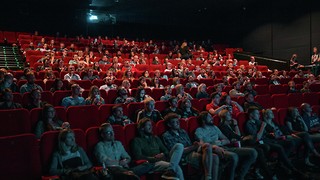An Englishman in Cairo: an interview with Patrick Kingsley
Hannah Wilkinson talks to former Varsity editor Patrick Kingsley about reporting on tumultuous times from Egypt’s capital

It would be nice to believe that Patrick Kingsley’s meteoric rise through the world of journalism is as much down to chance as his relaxed modesty seems to suggest. His chilled-out approach to everything from career advancement to covering protests makes becoming the Guardian’s Egypt correspondent at 23 sound like a stroll round the pyramids. But there is method to Kingsley’s modesty. From how he talks about journalism it is clear that talent and a sound understanding of modern journalistic principles are what propelled him from award-winning Varsity editor in 2009 to dodging bullets in Tahrir Square in 2013.
Egypt was rarely out of the headlines last summer. Following the removal from power of Islamist president Mohammed Morsi by the military, the country was plunged into a series of violent events in which thousands lost their lives. Cairo residents often woke to the buzz of military helicopters circling overhead. Frequent protests made it hard to move around the city. Every event was confused and contested. It was up to journalists to make sense of what was going on. Monday 8th July was no exception. As Islamist protestors prayed outside the Officer’s Club in Cairo, the military opened fire. Chaos ensued, in which at least 51 people died.
Kingsley’s “in depth reconstruction” of these events, which took the form of an interactive map, was crucial in making sense of what happened. He insists on the impossibility of constructing what he calls a “bullet-proof narrative – there’s was no camera hanging over everything from a bird’s eye view”. Nevertheless he painstakingly utilised a combination of witness accounts and social media to create his report.
“You talk to as many people as possible, cross-reference their testimony with videos, with residents, with tweets from the time, start to create some kind of narrative. It’s not a perfect process but it’s maybe a few steps towards that.”
The piece won him the 2013 Frontline Award, commended for what the judges called Kingsley’s ability to “create a narrative out of chaos”.
Liveblogging from chaotic events as they occur, Kingsley emphasises the increased difficulty of creating any kind of narrative. Negotiating stones, tear gas, and often bullets, Kingsley’s relaxed side serves him well in many of Cairo’s more hair-raising situations.
“When you’re in these dangerous situations you kind of need to keep calm. You gain nothing by panicking or getting scared. I almost zone out of an emotional state”. If you’re going to get the story, emotions cannot hold you back: “I need to get the information I need, I need to get the quotations I need, I need to count the number of bodies, I need to see where these people have been wounded and then once I’ve got the information I need, I’m going to get out as soon as I can for my own safety”.
About a month after the incident outside the Officer’s Club, the military decided to cement their grip on power by clearing the Islamist protest sit-ins, which had been ongoing since Morsi’s ouster. On the first day of these clashes, several journalists were killed. Four days later, at the scene of a besieged mosque, Twitter was on tenterhooks as Kingsley also went missing. Recounting his experience, Kingsley drops his cool for the first time, describing himself as “shit scared”.
“Basically you could call it an abduction”, he says. “I was a bit greedy for one more conversation with a witness and I didn’t get out of a slightly hairy situation as quickly as I should have.”
In the chaos of the square outside the mosque, Kingsley was mobbed by a group of vigilante soldiers. Two of them took him off on a motorbike. “They sort of slapped me around a bit and grabbed my balls and drove me off into somewhere in northeast Cairo,” he tells me.
Kingsley describes the fifteen to twenty minute journey as “probably the most frightening experience of my life”. “I thought this could be something pretty brutal, maybe I was going to get beaten up and no one would know where I was.”
Kingsley was in luck. He ended up spending a few hours in a police station, but is aware that his fate could have been far worse.
The arrest and detention of journalists throughout the summer was not uncommon, but in what Kingsley calls a “shocking” turn of events, three Al Jazeera English journalists are still in custody. Should he be worried? As Kingsley points out, relations between Al Jazeera and the Egyptian government are historically fraught. But this doesn’t stop the news from being “a little bit vexing.”
“I think at the back of all of our minds is who will they go for next.”
I ask him if he ever gets worried calls from his mum. “I got the odd concerned email” he says casually. “My friends and family and colleagues have just been very good at not adding to the worry of being in situations. Or just don’t care.”
When I ask him for a comparison between his Cairo experience and editing Cambridge’s oldest student newspaper, he politely tries to find one. Protests in Cambridge tend towards lacklustre at best, but Kinsley clearly feels he owes the paper a lot. “One of my favourite things I’ve ever done was editing Varsity”, he recalls. He got his big break as a Guardian features writer off the back of winning a bunch of student media awards as editor. But whenever he’s asked about his success he describes himself as “riding on the coattails of some really talented people”.
“The experience of weathering a storm for a whole term and working with really talented people fills you with a lot of confidence”, he says. “The experiences aren’t directly comparable but the kind of willpower and sometimes the guts that you have to have serve you well in any context - be that even in Egypt during a time of conflict.”
 News / Tompkins Table 2025: Trinity widens gap on Christ’s19 August 2025
News / Tompkins Table 2025: Trinity widens gap on Christ’s19 August 2025 Comment / A plague on your new-build houses18 August 2025
Comment / A plague on your new-build houses18 August 2025 News / Pro-Palestine activists spray-paint Barclays Eagle Labs18 August 2025
News / Pro-Palestine activists spray-paint Barclays Eagle Labs18 August 2025 News / Pro-Palestine activists urge new Chancellor to ‘condemn Israel’20 August 2025
News / Pro-Palestine activists urge new Chancellor to ‘condemn Israel’20 August 2025 News / Trinity sells O2 Arena lease for £90m12 August 2025
News / Trinity sells O2 Arena lease for £90m12 August 2025









